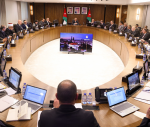You are here
‘Outsource curricula!’
Mar 24,2016 - Last updated at Mar 24,2016
We are witnessing a heightened focus on public school curricula by many stakeholders, primarily NGOs and a variety of emerging pressure groups.
This is a welcome development.
Much is being said by way of informed analysis and constructive criticism that the ministry could benefit from: on the content of the curricula, the modes of teaching/learning, and the disconnect between the output and societal needs.
This heightened focus is, in part, a result of decades of dissatisfaction with the outcomes.
Currently, a clear mismatch exists between the skills — or lack of them, rather — students develop and the actual needs of the students, the workplace and society.
Much of what the students learn is theoretical and irrelevant, due to rote learning. And it helps them neither at university, where they need to have come with rigorous personal and study skills so as to make the best out of their university years, nor in the market for those who seek employment.
Furthermore, many of the said NGOs and pressure groups are particularly worried about the negative effect of some of the content and reactionary attitudes and ideologies of some of the teachers on students’ attitudes and outlook.
Some of the content, directly or tacitly, appears to incite and espouse extremism and violence.
At a time when the region is plagued with all kinds of extremist groups who are targeting young men and women through all means at their disposal, including social media, many are right to fear that such uncalled-for fundamentalist content could play in the hands of extremists.
Students, during the crucial formative years, are especially susceptible to influence by textbooks and teachers.
In the absence of robust critical-thinking skills, and in a system that is almost entirely based on spoon-feeding, students tend to swallow what they read and hear without questioning.
They have neither been encouraged nor ever trained to challenge, doubt and criticise ideas. As a result, they take what they read in books or what they are told by their teachers as sacred.
This is very dangerous.
Several solutions have been suggested to tackle this unsettling concern, and it is time to act.
One was proposed by the Royal Consultative Commission on Education, which was formed a few years ago.
Benefiting from the Lebanese experience, the commission proposed creating a national centre for curricula, independent from the ministry.
The centre is to be guided by a board of experienced, forward-looking trustees and is to hire or commission expert curricula developers and designers.
The Lebanese experience is very successful, and something along its lines can be created in Jordan.
Ultimately, this is the solution. But if Jordan is unwilling or unable, for economic and other reasons, to implement this proposition at this point in time, there is a middle solution: outsource the authoring and design of curricula.
The ministry already has an experience it can capitalise on.
A few years ago, I was on a committee that advised the ministry on English curricula, and the ministry outsourced the curricula to a reputable international publishing house.
The company authored and designed according to general objectives, outcomes and guidelines presented by the ministry, and the experience was successful.
The ministry can do the same with the rest of the curricula.
Outsourcing is, in fact, a global trend now, and it should relieve the ministry of a lot of expense and hassle.
There are many professional curriculum development and design companies that can do the job. If the ministry forms an able advisory committee — composed of experienced and enlightened individuals with a proven success record — our curricula could improve dramatically and allay many of our concerns and fears.
Now that society is speaking about the matter vocally and is providing much useful feedback, the ball is in the ministry’s court.
It is time to act, and outsourcing could be a good start.













